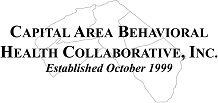Training Opportunities
Depending on the topic, trainings are either posted here to view, or you can access trainings via the websites listed.
Benefits and Services for Veterans and Their Beneficiaries
Presented by James P. Stafford
Southeastern PA Region Veterans’ Service Specialist, PA Department of Military and Veterans Affairs
The audio presentation runs from approximately 30:50 through 57:33.
Eating Disorders
Presented by Jennifer Shook, MD
Dr. Shook is the Clinical Leader of the Outpatient Eating Disorder Program at Penn State Children’s Hospital.
What to Do When Your Healthcare Rights are Violated
Presented by Casey Pegg
Community Organizer, Pennsylvania Health Access Network (PHAN)
PHAN is a consumer-driven healthcare advocacy nonprofit organization working to expand and protect access to high-quality, equitable, affordable healthcare for all Pennsylvanians. The audio accompanying the power point presentation runs from approximately 7:55 through 46:30.
Consumer and Family Advocacy for Behavioral Health Services
Presented by Lloyd G. Wertz, MS
Vice-President for Policy and Program Development, Family Training and Advocacy Center
Do you want to start a movement to benefit the mental health community? This presentation describes the “tools” and explains the power of advocacy. You will learn how being an advocate can have far-reaching positive impacts on the public’s health by providing policymakers with the information they need to make decisions and, in turn, influence legislation. In order to lift the stigma of mental health you will learn steps needed to educate not only government but the community.
Peer Support and Recovery Trainings
For information on State-certified Peer Support and Recovery Trainings in Pennsylvania, please visit the Pennsylvania Peer Support Coalition website.
Pennsylvania Medical Marijuana Program
Presented by Eric Hauser, RPh
In this presentation, Mr. Eric Hauser, Pharmacist and owner of Organic Remedies, discusses the Medical Marijuana program and process in PA, as well as products and services offered by his company.
Handout
Bullying Prevention & Resolution
The Bullying and Prevention Training sessions were not able to be recorded; however, the materials presented here were used during the sessions.
Session 1: Understanding Bullying and What We Can Do
Presented by Leah Galkowski
Center for Safe Schools, PA
Safe Schools CoordinatorThis presentation provides participants with an understanding of what bullying is and what it isn’t. A definition of bullying behavior is provided along with an overview of its short-term and long-term impacts. Participants in this presentation are provided with information to address bullying behaviors individually and as a group. Information is provided regarding evidence-based practices in bullying prevention.
Presentation
Interview Questions
Reflection
Session 2: Beyond Bullying – Protected Class Bullying
Presented by Michelle Nutter
PA Office of Attorney General
Education and Outreach Program Manager
Civil Rights Outreach Specialist
When we think about bullying, we often think about it playing out in schools or on social media. But it’s important to note that bullying is a social phenomenon – it can occur anywhere people gather. And while we may hear more about bullying among school-aged youth, bullying is a behavior that is not outgrown and manifests itself across the life span. As schools and youth-serving organizations, employers, community groups and senior centers work to successfully prevent and intervene in acts of bullying, they are often challenged by bullying behaviors that cross the line into civil, civil rights or criminal law violations. This training examines federal and state statutes that prohibit bullying and harassment based on protected classes, such as race, color, national origin, gender and disability. It also covers information relative to possible criminal law implications when bullying behaviors cause mental or physical injury to targeted students. Finally, the session reviews best practices in preventing and responding to bullying situations wherever they occur.
Resiliency through Relationship: Understanding and Responding to ACEs
Presented by Tara Byers, MS, NCC, LPC, ACS
Experiences of neglect, abuse and household dysfunction, referred to as Adverse Childhood Experiences (ACEs) significantly impact every aspect of human development – physical, neurological, psychological and social. Unfortunately, ACEs are common. The Centers for Disease Control and Prevention estimate that 61% of adults, in the United States, have experienced 1 ACE and 1 in 6 individuals have experienced 4 or more ACEs. As such, ACEs represent a significant public health issue. This training will assist participants in understanding what ACEs are, as well as their impact on child and adult mental and physical health functioning. Challenges to therapeutic interventions will be presented and current intervention recommendations to support resilience/recovery from ACEs will be discussed.
Responding to Trauma with a Brain-Based Approach
Presented by Michael C. Ritter, MPA, CTCP
Using Bruce Perry’s Brain States Paradigm and 3 R’s as the foundation, participants will learn a variety of practical tools to manage strong emotions and sensations in a brain-based response to trauma. This session will be highly interactive.
